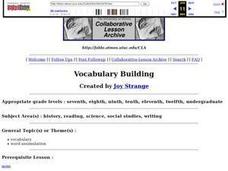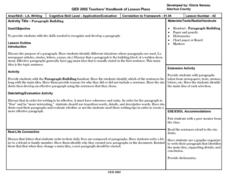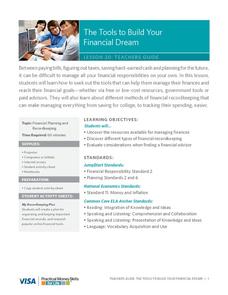Curated OER
Style and Voice
Develop the writing skills of your high school class. Writers consider their personal style and voice, read selections by other authors, and then write pieces that challenge them to experiment with their own style.
Curated OER
Heroic Vocabulary: Using Decoding Strategies and Thesaurus
Develop the decoding skills of your middle and high schoolers. Scholars participate in a classroom activity that requires them to decode a word with a prefix and suffix. They apply the skill of breaking the word into parts of meaning as...
Curated OER
Modernism in Poetry, Painting, and Music
Are you teaching Modernism to your class? Connect different areas of artistic expression in the Modernist Era. Learners read T.S. Eliot, view art by Pablo Picasso, and listen to a Modernist musical composition. This final assignment is...
Curated OER
Vocabulary Building - Declaration of Independence
Young scholars read the first part of the Declaration of Independence and mark the words they don't know. First, they try to guess what the words mean by looking at the them in context, and then they look up the words in a dictionary.
Curated OER
Irony in Poetry and Prose (Fiction and Non-fiction Texts)
Middle and high schoolers examine the impact of irony in poetry and prose. In this figurative language lesson plan, they read instructor-selected literature and identify uses of irony. Then they discuss how irony enhances literature.
Curated OER
Two Sides, Same Coin: How Political Beliefs Influence Language Use
Learners read several magazine articles on the same topic written from different political perspectives, paying particular attention to the diction, syntax, and arguments presented in support the point of view expressed. They then select...
Curated OER
Paragraph Building
Build the skills your budding authors need to develop to compose well-structured paragraphs. Give them the topic sheet (included here), and have them write a cohesive paragraph using the ideas listed. Consider having them include two...
Curated OER
Narrative Nuts and Bolts
After viewing slides and reading about child labor, young authors compose an original narrative story. They practice note-taking skills and work to effectively engage a reader by incorporating plot, logical order, complex characters,...
Curated OER
Introduction to Poetry Lesson Plan
Analyze poetry in a group setting. Middle and high schoolers read lyrics to a Tom Petty song and free write about the song's tone, setting, and speaker. They then complete the same activity in a group setting using seven poems. The...
Curated OER
Essay Writing
Are your learners working towards their GED? First they study the GED essay rubric, and then they read a sample essay as a group. After studying the basic elements, they write an essay of their own. After peer editing, they revise their...
Curated OER
Dr. Heidegger's Experiment
What are the pros and cons of prolonging life? Incorporate real-world issues into the study of literature using Dr. Heidegger's Experiment. Through the exploration of pre-determined websites, scholars consider several related literary...
Curated OER
Literacy in Content Areas: Think Aloud
Fifth graders examine the "think aloud" reading strategy. In this reading strategies lesson, 5th graders apply the think aloud strategy to solving word problems in math.
Curated OER
Persuasive Elements
Investigate letters to the editor and their persuasive qualities. Break your class into reading groups and give each one a different article. As they read, they complete a graphic organizer to record their thoughts and opinions. There is...
Curated OER
Hiibel vs. Sixth Judicial District Court of Nevada
Did Hiibel's arrest and conviction for not telling a police officer his name violate his rights? Have your learners read a short description of the case and answer the comprehension questions that follow. Resource links and extension...
Perkins School for the Blind
Letter Confusion
Teaching a child with low or no vision how to read is the same as teaching a sighted child how to read — it all starts with letter recognition. This is a simple way to provide your learners with an opportunity to practice reading and...
PBS
Journalism Ethics
As a journalist, would you publish everything you heard or saw? Discuss the ethics of journalism with a instructional activity from PBS. Young reporters imagine themselves to be the editor of their school's newspaper, and as they read...
Achieve3000
Figurative Language
Similes and metaphors make writing more beautiful and detailed, but can be a little harder to decipher during a first reading. Use a passage from The Man Who Loved Words to show young readers how to think through passages that contain...
Channel Islands Film
Cache: Lesson Plan 2 - Grades 4-6
Class members will dig this activity that has them trying their hand at recovering artifacts. Groups are assigned a section of a sandbox, carefully uncover the artifacts in their section, and then develop theories about who might have...
Scholastic
Marijuana: Breaking Down the Buzz
Teenagers get the real information about marijuana use based on the history of tobacco legislation and research. As they read an educational passage about marijuana laws, science, and changing attitudes, they address their preconceptions...
National Endowment for the Humanities
Tales of the Supernatural
Scary stuff! Whether approached as the first horror story or a "serious imaginative exploration of the human condition," Frankenstein continues to engage readers. Here's a packet of activities that uses Mary Shelley's gothic novel to...
Visa
Keeping Score: Why Credit Matters
How does one get credit, and who provides credit? What is a credit score, and how can an understanding of a credit score help you to make smart financial decisions? Through discussion and worksheets, class members will identify the...
Visa
The Tools to Build Your Financial Dream
When it comes to all the ways money management and financial responsibility weave into our daily lives as adults, make sure students are prepared to locate resources for managing their finances, such as a financial advisor.
Visa
Allowances and Spending Plans
Help youngsters understand how to manage small amounts of money by discussing an allowance and the difference between spending, saving, and giving.
Channel Islands Film
Cache: Lesson Plan 1 - Grades 9-12
Archaeologists have discovered a cache of Native American relics. They want to preserve these relics by removing them from the rapidly eroding site to a lab where they can be studied. Native American traditions demand that the items be...

























